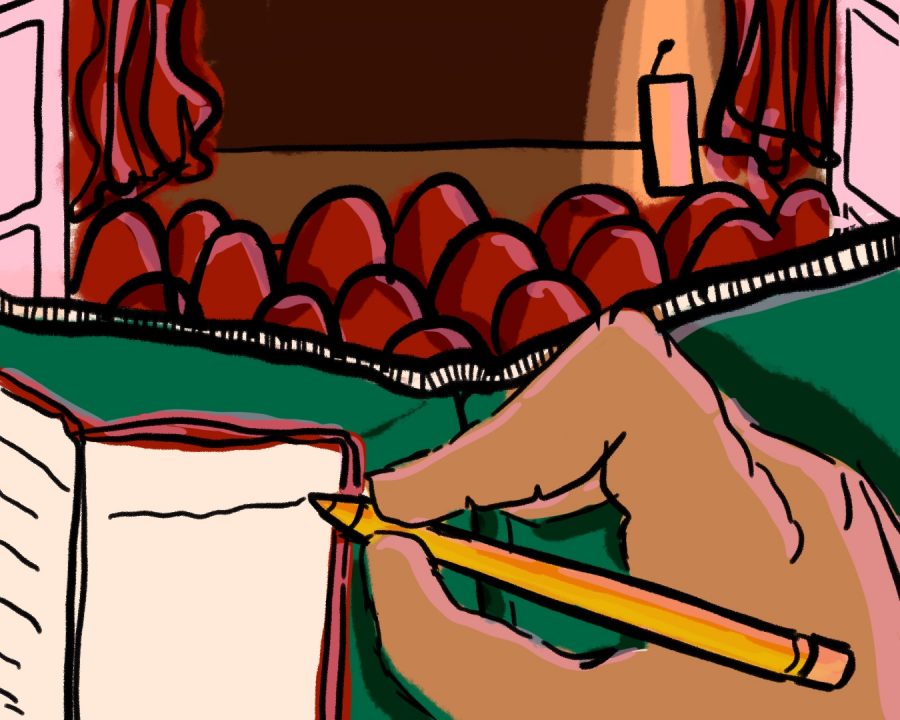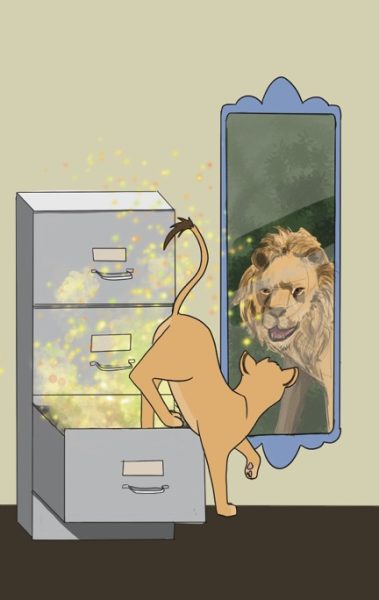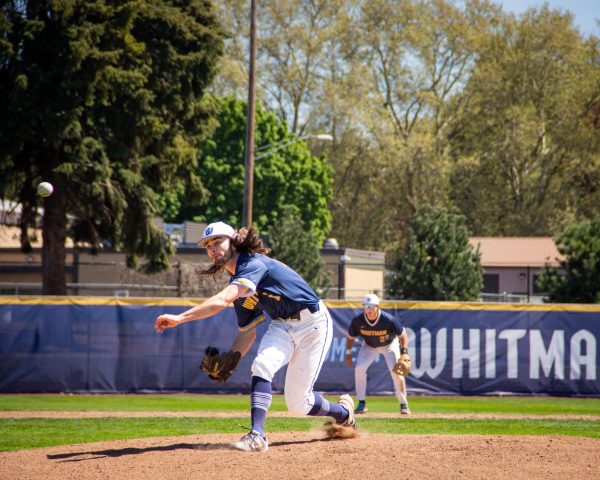Authoring spaces for the literary arts: Whitman’s Visiting Writers Reading Series
October 9, 2019
Within the wilderness of the Pacific Northwest lies a community of writers, readers and lovers of literature who work in conversation to further their art form.
Port Angeles born poet and author Tess Gallagher, wife of famous Northwest author Raymond Carver, is one member of this intimate community.
She spent her Thursday night reading her latest work to a bursting auditorium of Whitman professors, students and community members on Oct. 3.
Gallagher is one of the many authors brought to Whitman through the Visiting Writers Reading Series, a program instituted and directed by Creative Writing Professor Katrina Roberts and sponsored by the English Department.
The series brings writers to Kimball Theatre to share their work, and it has grown to epitomize the liberal arts community Whitman students learn within.
When Roberts arrived at Whitman as the first full-time tenure track creative writing professor on campus, there were sporadic visits from writers and professors of poetry, like Gallagher, but Roberts wanted a robust, steady program to inspire students and community members with the work of established and emerging authors.
“It seemed to me crucial when I arrived at Whitman over a decade and a half ago to establish a consistent Visiting Writers Reading Series dedicated to bringing active writers in all genres to campus for readings and discussions — events that would be free and available not only to our community but to residents of the greater inland northwest,” Roberts said. “In directing the Series, I’ve wanted to bring a diversity of writers representing a range of genres, genders, orientations, perspectives, geographies, backgrounds, etc.”
From students to professors to book club members, the vibrant literary community surrounding Whitman has been strengthened through the series events.
Natalie Flaherty, a junior art history major and creative writing minor, regularly attends the visiting author series, whether or not her classes require her to.
“It’s a really unique opportunity, I think, to see where people go with their writing,” Flaherty said. “I think it frequently illustrates to me how everyone’s a different writer and it can be something you craft and change, and with the Visiting Writers Series you see how successful that is, which is really reassuring and motivating. I sometimes feel like I get in my head about like, I’m not the right kind of writer to be published, like I can’t go anywhere with this stuff and the Visiting Writers Series is like — here are all the people who went somewhere with this stuff. It’s just beautiful.”
Flaherty was one of the many audience members at Gallagher’s reading last week. For her, the reading held special meaning.
In the Introduction to Creative Writing class she took as a first-year, Flaherty read Gallagher’s poem “Wake” about her deceased husband, Raymond Carver. The poem stuck with her, so when she realized Gallagher was coming, she knew she had to go.
“I remember I wrote it down in my journal because I was so struck by her and it was one of the poems I really remember, and I still have it in that journal,” Flaherty said. “Her poems are so beautiful and it was an honor to get to hear her recite it.”
That deep connection, realized from real interaction with an author, is one of Robert’s major goals for the series, and it is part of why English Department coursework often features the visiting author’s work or at least encourages students to attend.
“Interactions with visiting writers deepen the experience of exploring published works in classes,” Roberts said. “When the texts come alive off the page, as voiced by the writers themselves, they expand for those of us in the audience.”
When selecting authors for the series, Roberts approaches topics holistically, looking to overlap genres and academic fields. By bridging the gap between disciplines, the program is amplified to all on campus, creating a space that welcomes community.
“I try to bring writers whose work is relevant and challenging in a cross-disciplinary way, as well — a notion central to the liberal arts; we’ve had writers come whose work, though sometimes highly literary, appeals to those interested in environmental issues, in politics, in science, in history, in art, in gender issues, etc.,” Roberts said.
In that interdisciplinary complexity lies the majestic beauty of the liberal arts — beauty that makes the never-ending academic slog in the middle-of-nowhere bearable. It gives space and appreciation for all the disciplines. It provides programs for visiting poets and new spaces for collaboration in the Hall of Science. It is communities of intellectual vigor and virtue that go beyond their demarcated fields. The Visiting Writers Reading Series is one such program that is available to all and can impact anyone.
“My friend went with me to a nonfiction writer who came last year, Inara Verzemnieks, and [my friend] is a psychology major and she cried when she was reading,” Flaherty said. “It was the type of thing that can bring anybody regardless of major or interest. You can listen as a listener, as a writer, you can listen as a human being. I think that’s really powerful.”
At the same time, Roberts and Flaherty both emphasized the importance of the continuation and support specifically for the fine arts on campus. In tumultuous political and social times, literary arts have a unique power and place at Whitman and beyond.
“It’s essential for a small liberal arts college to proclaim the fine arts as crucial,” Roberts said. “Also, more than ever, we need creative thinkers, inventors, those who see and hear and feel on their own, who are brave enough to express themselves, to reach out toward others to bridge differences. Of course, I hope that Whitman College will continue to support its thriving and crucial fine arts offerings.”
In pursuit of creative writing at Whitman, Flaherty often feels limited by the lack of a creative writing major, although she recognizes the demand may not be there. During her first year at Whitman, she felt restricted by the available options and unable to delve deeply into her passion.
“I got here and I really wanted to major in creative writing,” Flaherty said. “That’s what I wanted to do. I wanted to just focus on that. I care about my writing a lot.”
Without the singular pathway of creative writing, Flaherty was forced to try new things, opening her eyes to the benefits of the liberal arts degree. However, she strongly disagrees with the perceived shift towards prioritizing STEM subjects over fine arts at Whitman.
“I then discovered Art History and that was a whole other thing that was really great, and I think I wouldn’t have done if I had been so focused on the writing aspect. And that’s really helped my writing in other aspects,” Flaherty said. “I think that’s the point of the liberal arts education. I’m in a STEM class and it’s for my quantitative and it’s really broadening my horizons. But I do think sometimes it feels like all our funding goes there…it feels kind of depressing.”
Based on numbers of students in each major, there are significant shifting interests on campus. According to the Whitman Institutional Research Factbook, in 2014 there were 31 English majors and as of 2018 that numbered dropped to 13. Meanwhile, the number of Psychology majors rose from 26 to 32 and Biology, which remained one of the most popular majors, numbers consistently in the 40s.
The numbers of students in each major, however, illustrates the diversity and breadth of what Whitman students study. Flaherty specifically mentioned knowing quite a few Math majors who are also Creative Writing minors. Flaherty notes this unique variety and attributes it to the liberal arts philosophy.
“I think that definitely the liberal arts education encourages stuff like that with the idea that you don’t have to set aside all your other academic interests so you can be a prose writer, which sometimes I feel like I have to do… but I don’t,” Flaherty said. “I think that’s a cool outcome, but I also feel like sometimes it’s hard to find a community to write in.”
The challenge of finding a community proved difficult for Flaherty as a first-year student and contributed to her feelings that the fine arts aren’t well represented on campus. The lack of a major only exaggerated those feelings of isolation.
“I think it was hard to find a place to feel like people saw the world the same way I did or felt passionate about the same things I did,” Flaherty said. “And then I started going to Poems Club and that really helped, and I started going to Visiting Writers and that helped.”
The community of passionate fine arts enthusiasts revealed itself to Flaherty through the people she met along the way. Those connections are bonds that last a lifetime. Gallagher suggested that these bonds are unique to the Whitman community.
“I really realized that the very best teaching experience that I had in my entire teaching career was here at Whitman College,” Gallagher said to the audience during her reading. “And a big part of that was the excellence of the students, but also my colleagues. I never had better. So you may rest assured that you have really some wonderful professors that you study with.”
Flaherty felt similarly as she recalled relationships formed in the classroom that have powerfully shaped her writing, character and experiences by challenging and inspiring her.
She mentioned taking Intermediate and Advanced Creative Nonfiction classes with Professor Kisha Schlegel, courses that opened her eyes to a genre she knew and loved but had yet to name.
“I think it pulled my head out of my ass a bit,” Flaherty said. “It felt right in a way poetry and fiction didn’t and those are really cool genres and I’m exploring them more now, but I had never found anything quite like nonfiction.”
For Flaherty, Creative Nonfiction challenged her perceptions of what writing is and can be and opened doorways she didn’t know existed. Most of all, it widened her worldview and welcomed her into the literary community.
“I felt like everyone in that class looked at the world in a different way than I did and it was cool to be a part of that community,” Flaherty said. “I think the classroom really fostered that and it really changed the way I write in a good way.”
The class often had off-campus writing meetups, and Flaherty mentioned how Schlegel talked about the notion that “someone in the class could be your reader of a lifetime.” For Flaherty those words rang true — she recently reached out to a recent Whitman graduate asking them to read her work, illustrating the enduring strength of connections made in the classroom.
“It’s crazy how you form writerly bonds that will last you a lifetime,” Flaherty said.
Those writerly bonds were on full display at Gallagher’s reading. Gallagher mentioned former Whitman student Katie Ford, an English major, who graduated from Whitman in 1997 and is now well-known for her poetry. She currently teaches at the University of Iowa.
“Katie and I are still in touch and I think you can be so proud of her, because she is such a wonderful writer and she should inspire a lot of young Whitman writers to get out there and do your best,” Gallagher said.
Future English major and current sophomore Annika Hobson also attends the Visiting Writers Reading Series readings for class and enjoyment. Creative Writing and English Professor Scott Elliott, who is one of Hobson’s professors, encourages his students to attend the readings.
In regards to Whitman’s representation of the fine arts, Hobson acknowledges the feeling that academic focus is moving towards the world of STEM. However, she identified the continuation of the Whitman liberal arts tradition. Despite shrinking numbers, in her eyes the major spiritedly persists.

“There’s definitely a lot more science and biology and stuff like that, but there’s still a good representation,” Hobson said. “The English major is pretty small itself but within the major there’s a lot of really passionate people.”
That passion is visible at events like Gallagher’s reading of her latest work. During Gallagher’s time at Whitman from 1996-97, she taught a class called “Not Understanding.”
“I had designed this class to bring students toward poets who were really difficult — the most difficult poets I could find and to get them to understand that they could find a way into the difficulty,” Gallagher said. “I’m trying to take them through the doorway of not understanding. I think it was one of the best classes that I had. “
Part of what made her class and experience here memorable was the enthusiasm of the people. Gallagher emphasized the dedication and drive of her students. She explained she had a large lecture class and that students would “meet before the lecture class and hatch all the schemes they were gonna take into the class. So there was a class before the class, and this was how ardent the students got,” Gallagher said. “I’ll never forget that.”
From the stories and perspectives of many Whitman writers past and present, the people are what create this lasting Whitman community of literature and learning. Looking back, Flaherty acknowledges that despite the challenges, she has found her writing community.
“The people are wonderful and I do think I found some people who read my work in a helpful and introspective way and see things I never did, and I wrote it,” Flaherty said. “I hope I can be that for other people too. I think that that’s something that’s part of the greater Whitman culture, reading someone’s work with compassion and care and also not lying about it and giving helpful feedback.”
The creation of writer friends and the enthusiasm of individuals is what keeps this community thriving, decade after decade regardless of funding or numbers. This community impacts students beyond academics and encourages personal growth and fulfillment.
“I think that really challenged me to own my tastes and my own writing,” Flaherty said. “And gather the courage to tell other people what I admired about theirs and be honest and direct with other people, especially about something that’s really important to me like this art.”
In her parting advice to students, Gallagher mentioned something similar. She highlighted the grit and determination that success demands, and her words are applicable to everyone, regardless of academic pathway.
“If you stick with it, that’s the main thing, is to stay with it,” Gallagher said. “Now you see how long I’ve stuck with it. I was seventeen when I became a student of Theodore Roethke in his last class. Now I’m seventy-six, so it’s a very long time I’ve stuck with it.”
For those overwhelmed by the arduous journey ahead, the Visiting Writers Reading Series offers motivation and inspiration, even if showing up is challenging. Finding the time to attend a Thursday night reading can touch anyone, and for those writers, readers and lovers of literature, it fuels the fires of dreams and forms the foundations of lifelong communities.
“I feel like I’m really scared to go, even when my professors are like ‘go the Visiting Writers, I hope to see you there,’ and I’m like, ‘oh no it’s at seven it’s a Thursday I have to sit and listen,’ I think that I find more often than not I feel moved, inspired and like my art has changed,” Flaherty said. “Sophie Johnson came last year, and I got to hear her talk about writing at Whitman and what that was like. She went here and I feel like that’s crazy and sometimes I just think that could be me.”






